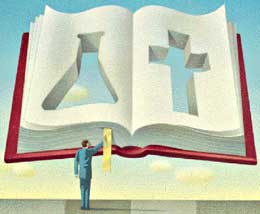 In
ancient times, much of what we now call science was
the handmaiden of religion. In ancient Babylon, for
instance, only priests were permitted to study astronomy
and mathematics. Egyptians used geometry to build pyramids
and estimate the volume of water in their reservoirs.
But religion may have been a limiting factor. Neither
Egypt nor Babylon turned to science when mulling over
the nature of the universe. For that, they relied on
mythical explanations.
By
contrast, the Ionians, who had emigrated from Greece,
lived in a far more hostile environment and weren't
tethered by religious restrictions. Spurred by necessity
and freed from theocracy, the Ionians asked fundamental
questions about how the universe worked, according to
author James Burke in The Day the Universe Changed.
An early Ionian, Thales of Miletus, is credited with
using the constellation Ursa Minor as a point of reference
for navigation. With his students, Thales investigated
weather patterns, magnetism, condensation, and other
aspects of the world around them.
In the Middle Ages, as Europe spurned science, Moslem
scholars kept math, astronomy, and biology alive by
expanding upon the sciences of ancient Greece. In particular,
the Koran deemed biology as being close to God. Much
of this knowledge was preserved in great libraries built
by the growing Islamic empire in Spain, notably the
library established in the city of Toledo. The city
fell to Christian crusaders in 1085 and, soon after,
Christian monks translated the works into Latin. It
made sense that this task fell to the monks; until modern
times, only priests and the wealthy were sufficiently
educated for the job.
Later, in the mid-1700s, European philosophers argued
that science and religion were separate disciplines.
And yet, hostility didn't ensue. Enter Charles Darwin,
who shook segments of Christianity with a theory of
evolution that conflicted with the words of Genesis,
and science and religion were officially at odds. In
his 1874 bestseller, History of the Conflict Between
Science and Religion, medical school professor John
Draper fueled the belief that the Catholic Church was
the enemy of science, blocking progress "by the sword
and the stake." Adding to the controversy was Cornell
University President Dickson White's 1896 book The
History of the Warfare Between Science and Theology
in Christendom. As the clash of words continued,
perceptions changed, and the image of the two sides
being at war prevailed. So it has remained since the
latter part of the 19th century.
In reality, the issue is far from cut-and-dried. While
fundamentalist Christians in America continued to denounce
evolution, a 1996 conference sponsored by the Vatican
Observatory and the California-based Center for Theology
and the Natural Sciences concluded that evolution and
Christianity were compatible. "Religions have often supported
scientific endeavors," says Oberlin's Joyce McClure, assistant
professor of religion. "There's no inherent conflict between
the two disciplines, in my view."
But recent developments, particularly in genetics, are
already fostering new dissension. "Any form of genetic
manipulation of humans or animals has the potential for
causing a problem for religious persons," says McClure,
who teaches courses on ethical issues facing science.
But simple genetic manipulation may not be enough to set
off warning bells among Christians and Jews. Both traditions
have embraced the idea
that change--through evolution or through humanity's manipulation--is
part of the nature of things, she says. "There's nothing
new about that.
"The best candidates for a problem," McClure adds, "would
be things that reduce complexity. If it becomes possible--and
widespread--to select pre-embryos for intelligence or
physical strength, for instance, we would be selecting
one group over another, one that would have an advantage
over other segments of the population."
Ironically, the Big Bang theory, among the most complicated
and controversial theories to emerge in the 20th century,
wears well in many religious and non-religious circles.
"The idea that there was this event that brought space
and time into existence is appealing to people of faith,"
says McClure. "The idea of God as being eternal and
outside of time has been long-standing. And that concept
is not specific just to Christianity."
|



